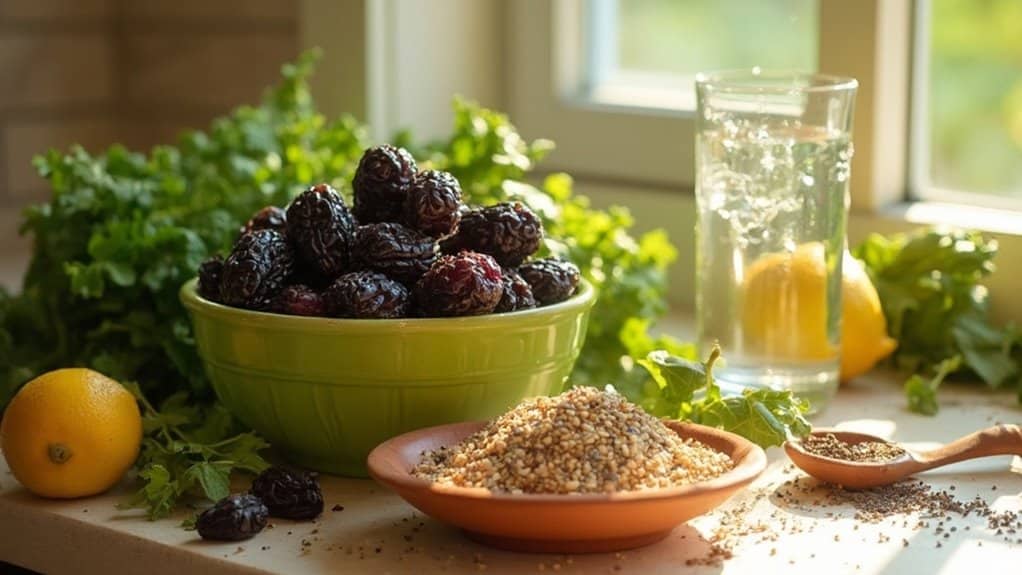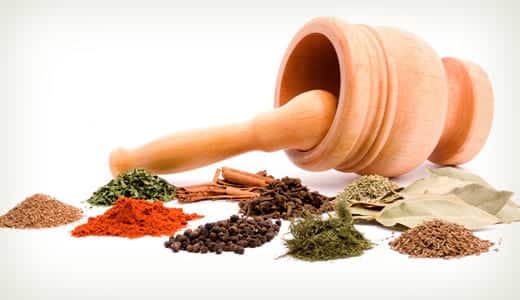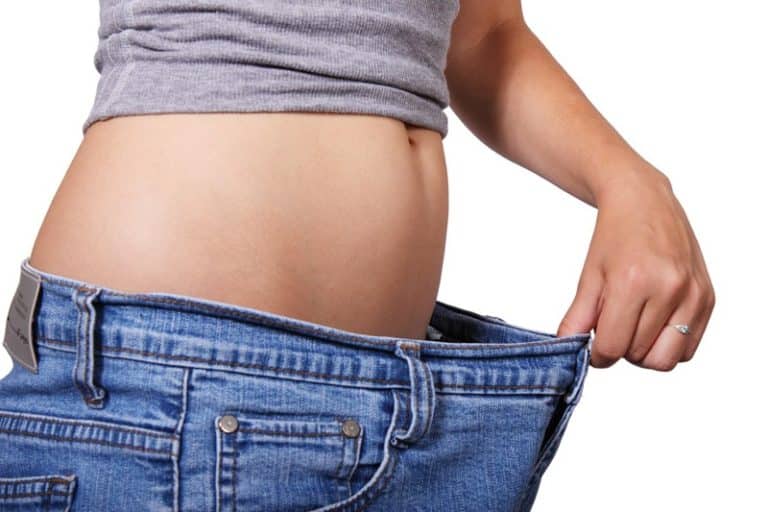10 Natural Remedies For Constipation

If you’re struggling with constipation, you’re not alone. Many people seek effective, natural remedies to ease their discomfort. Simple changes in your diet and lifestyle can make a significant difference. By incorporating specific foods and habits, you can promote regularity and improve gut health. Curious about the best approaches to tackle this issue? Let’s explore ten natural remedies that could help you find relief.
Increase Soluble and Insoluble Fiber Intake
To effectively combat constipation, you should consider increasing your intake of both soluble and insoluble fiber.
Fiber-rich foods for constipation include whole grains, legumes, nuts, and fruits. Soluble fiber, found in oats, beans, and fruits like apples, absorbs water to soften stools, making them easier to pass. Drinking more water can also enhance the effectiveness of fiber by keeping the digestive system hydrated.
On the other hand, insoluble fiber, present in wheat bran and vegetables, adds bulk to your stools, helping them move through your digestive system more quickly. A balanced mix of these fibers can enhance stool frequency and consistency.
Aim for at least 25 grams of fiber daily, as recommended by health experts, to reduce reliance on laxatives and promote overall digestive health.
Stay Hydrated With Water and Herbal Teas
Staying hydrated is key to preventing constipation, as it helps keep your stools soft and easy to pass. Incorporating water, herbal teas, and even carbonated water into your daily routine can boost your digestive health. Each of these options plays a unique role in keeping your system running smoothly. Additionally, maintaining proper hydration is crucial for the effectiveness of dietary fiber in promoting regular bowel movements.
Importance of Water Intake
While you might overlook the role of water in digestive health, staying properly hydrated is essential for preventing and relieving constipation.
The importance of water intake can’t be stressed enough—adequate hydration helps soften stools, making them easier to pass. When the colon absorbs excessive water from waste, it can lead to hard, dry stools that slow down your bowel movements. Drinking plenty of water is crucial because it helps remedy constipation by keeping the stool moist and easier to pass.
Experts recommend around four to six cups of plain water daily, though individual needs may vary. If you’re physically active or in a hot environment, you should increase your fluid intake.
Remember, drinking enough water not only supports your digestive system but also enhances the effectiveness of fiber, providing better constipation relief overall.
Stay hydrated!
Benefits of Herbal Teas
Herbal teas offer a delightful way to enhance your hydration and support digestive health, especially when combating constipation. Incorporating herbal teas for constipation relief into your routine can bring numerous benefits.
For instance, senna tea acts as a natural laxative, stimulating bowel movements, while peppermint tea relaxes digestive muscles and reduces bloating. Ginger tea boosts digestion by enhancing stomach acid production, and dandelion root tea aids digestion with its mild laxative properties. Additionally, herbal teas promote digestion by providing natural, gentle relief from constipation.
Chamomile tea soothes your intestinal muscles, easing stress-related constipation. By enjoying these herbal teas regularly, you’re not only staying hydrated but also promoting better digestion, making it easier to maintain regularity and comfort.
A cup of herbal tea could be the gentle nudge your digestive system needs!
Carbonated Water Effectiveness
If you’re looking for an effective way to stay hydrated and support your digestive health, carbonated water might be the answer.
Research shows that it considerably reduces symptoms of dyspepsia and constipation, offering constipation relief fast. Unlike tap water, carbonated water can decrease satiety, which may help your digestive process. Additionally, studies have shown that carbonated water can lead to significant improvement in gallbladder function, further enhancing digestive health.
It’s particularly beneficial for elderly individuals and those with functional dyspepsia, leading to increased defecation frequency and reduced constipation issues. The mineral content and carbonation itself could be key players in this effect.
While it’s a natural alternative to chemical laxatives, remember to balance your intake with a healthy diet and lifestyle.
Utilize Healthy Fats and Oils
Incorporating healthy fats and oils into your diet can greatly alleviate constipation. Healthy fats for constipation relief, like olive oil, help lubricate your digestive system, making it easier to pass stool. Additionally, consuming olive oil daily has been shown to relieve constipation effectively.
You can mix MCT oil into your coffee or smoothies for a quick boost. Add avocados to your meals, as they’re rich in healthy fats that support bowel function. Wild fatty fish, like salmon, provide omega-3 fatty acids that aid digestion. Don’t forget about castor oil, known for its laxative properties.
Using oils in salad dressings helps increase intake while replacing butter or margarine. By including these healthy fats, you’ll promote better digestion and ease constipation effectively.
Incorporate Probiotics and Fermented Foods
Probiotics and fermented foods play an essential role in relieving constipation by enhancing your gut health.
These constipation remedies, including yogurt, sauerkraut, and kimchi, contain beneficial bacteria that improve your gut microbiome balance. Strains like *Bifidobacterium lactis* and *Lactobacillus plantarum* can increase stool frequency and enhance stool consistency, making it easier to pass. Moreover, foods like *kimchi* and *sauerkraut* are rich in probiotics that can further support digestive health.
Incorporating these foods daily can stimulate intestinal function and promote the production of short-chain fatty acids, which aid bowel movements. Additionally, combining probiotics with prebiotic-rich foods can enhance their effectiveness.
If you find it challenging to get enough through diet alone, consider probiotic supplements. By adding these foods to your routine, you’re taking a significant step towards effective constipation relief.
Use Natural Stimulants and Spices
When you’re looking for quick relief from constipation, natural stimulants like ginger and coffee can be surprisingly effective. Ginger not only warms your body but also promotes digestive health, while coffee’s laxative properties can give your system a much-needed boost. Aloe vera is another great option, as it helps improve gastrointestinal motility, making it easier for you to find relief. Additionally, staying hydrated is essential for digestive health, as it improves stool consistency and aids in easier passage.
Ginger for Digestive Relief
While many people struggle with digestive issues, ginger stands out as a natural remedy that can effectively stimulate digestion and relieve constipation.
You can enjoy ginger for constipation relief by consuming it in various forms, such as raw slices or ginger tea. The warm properties of ginger increase your body’s internal heat, promoting better bowel movements. Its antioxidant and anti-inflammatory effects also help reduce bloating and cramping, making it a gentle option for digestive comfort. Additionally, ginger has been shown to decrease pressure on the lower intestines, aiding bowel movement.
For best results, drink ginger tea in the morning or after meals, and consider adding spices like star anise or cinnamon for enhanced benefits.
With minimal side effects, ginger is a safe choice for long-term digestive health.
Coffee’s Laxative Effect
Ginger isn’t the only natural remedy that can promote digestive comfort; coffee also plays a role in stimulating bowel movements. Many people find that coffee’s laxative effect helps them relieve constipation fast.
Both caffeinated and decaffeinated coffee can stimulate gastrointestinal activity, though caffeinated coffee tends to be more effective. This stimulation occurs through hormones like gastrin, which enhance digestion and promote colon contractions. Additionally, caffeinated coffee may increase stomach acid production and colon movements, contributing to its laxative properties.
However, responses vary, and not everyone experiences significant relief from coffee. While it may provide quick benefits, it isn’t a reliable long-term solution for constipation.
To maintain regularity, focus on hydration and fiber intake, and consider other natural laxatives if coffee doesn’t work for you. Always consult a healthcare provider for persistent issues.
Aloe Vera Benefits
Aloe vera is a powerhouse of natural remedies that can greatly aid in alleviating constipation. One of the main aloe vera benefits lies in its anthraquinones, which act as natural laxatives, promoting bowel movements effectively. By increasing intestinal water content and enhancing mucus secretion, aloe vera helps you maintain a balanced constipation diet. Its latex is especially potent but should be used cautiously to avoid discomfort. Additionally, aloe vera juice is rich in vitamins and minerals, which can further support digestive health and overall well-being. Regular consumption of aloe vera juice can soothe digestive issues, reducing symptoms associated with irritable bowel syndrome.
Engage in Regular Physical Activity
Engaging in regular physical activity can greatly improve your digestive health, especially if you struggle with constipation. Exercise for constipation works by speeding up digestion and stimulating intestinal muscles, making bowel movements easier. Here are some effective types of exercise you can incorporate into your routine:
- Walking: Just 10-15 minutes several times a day can stimulate bowel movements.
- Aerobic Exercise: Activities like jogging and dancing get your heart rate up and enhance intestinal contractions.
- Stretching and Yoga: These gentle exercises can also help relieve constipation.
- Qigong: Combining movement and breathing techniques can be beneficial for your digestive system. Additionally, increased breathing and heart rate during aerobic exercise can further support digestive function.
Remember to exercise about an hour after meals for the best results!
Consider a Squatty Potty for Easier Bowel Movements
If you’re looking for a simple way to enhance your bowel movements, considering a Squatty Potty might be the solution you need.
This device helps you adopt a squatting position, mimicking the natural defecation posture. Studies show that 90% of users experience less straining, while 71% report faster bowel movements. Additionally, 1 in 6 Americans experience chronic constipation, highlighting the widespread need for effective solutions.
By straightening the colon, it facilitates smoother stool passage, making it an effective tool for how to get rid of constipation fast. Plus, it relaxes essential muscles, promoting complete bowel emptying.
With no reported risks and benefits seen across various cultures, a Squatty Potty could be a game-changer in your quest for relief from constipation and improved digestive health.
Gradually Adjust Fiber Consumption
To effectively combat constipation, it’s essential to gradually adjust your fiber consumption rather than making sudden changes. This approach helps your digestive system adapt and minimizes discomfort.
Start incorporating these foods that help with constipation:
- Prunes: Packed with fiber and sorbitol for natural relief.
- Flax Seeds: High in soluble fiber, great for softening stool.
- Whole Grains: Foods like barley boost insoluble fiber intake.
- Legumes: Beans and lentils offer soluble fiber for added benefits.
Increased stool size from fiber can further enhance regularity. Remember to increase your water intake alongside fiber to prevent any adverse effects.
Avoid Foods That Contribute to Constipation
While incorporating fiber-rich foods is essential for alleviating constipation, it’s equally important to steer clear of certain foods that can hinder your digestive health.
Foods like refined grains—think white bread and white rice—are low in fiber, making them poor choices. High-fat and processed foods, such as fried items and fast food, can slow digestion and worsen constipation.
Sugary snacks and beverages might seem tempting, but they can exacerbate the issue. Additionally, dairy products can cause constipation for some, so it’s wise to monitor your intake. Hydration is also crucial, as staying hydrated helps fiber work effectively in your system.
Avoiding salty snacks and dehydrating beverages like caffeine and alcohol is vital too. By eliminating these foods, you can effectively improve your digestive health and find more suitable food for constipation in adults.
Seek Professional Advice for Persistent Issues
Although many cases of constipation can be managed with dietary changes and home remedies, persistent issues warrant professional advice.
If you’re dealing with chronic constipation, it’s vital to recognize when to seek help. Look out for these signs:
- New Onset Constipation: If constipation starts suddenly, don’t ignore it.
- Progressive Symptoms: Notice if your symptoms worsen over time.
- Changes in Bowel Habits: Be vigilant for narrow stools, weight loss, or bleeding. Additionally, keep in mind that infrequent bowel movements may indicate a more serious issue.
- Unmanageable Symptoms: If lifestyle changes aren’t working, contact a healthcare provider.
A professional assessment is essential for diagnosing potential underlying conditions and determining the best treatment plan for your chronic constipation.
Your health is worth it!
Frequently Asked Questions
How Long Does It Take for Natural Remedies to Relieve Constipation?
When using natural remedies, you can expect immediate relief from techniques like abdominal massage or warm fluids. Foods may take a few hours to a day, while long-term changes could take several days to weeks.
Can Stress Impact Constipation and Digestive Health?
Yes, stress can greatly impact your digestive health. It disrupts communication between your brain and gut, slows digestion, and alters bowel movements, potentially leading to constipation and other digestive issues you might experience.
Are There Any Side Effects of Using Natural Laxatives?
Yes, using natural laxatives can lead to side effects like bloating, gas, stomach cramps, and diarrhea. You might also experience nausea or dehydration if you rely on them too frequently. It’s important to stay mindful.
Is It Safe to Use Natural Remedies During Pregnancy?
Yes, it’s generally safe to use natural remedies during pregnancy, but you should always consult your healthcare provider first. They can guide you on which remedies are safe and effective for your specific situation.
What Are the Signs That I Need Medical Attention for Constipation?
If you experience severe abdominal pain, blood in your stool, vomiting, or an inability to pass gas, it’s essential to seek medical attention immediately. These signs could indicate serious underlying conditions requiring prompt evaluation.
Conclusion
Incorporating these natural remedies can make a big difference in alleviating constipation. Focus on increasing your fiber intake, staying hydrated, and including healthy fats in your diet. Don’t forget to add probiotics and natural stimulants to keep your digestive system running smoothly. If you’re still struggling, consider using aids like a Squatty Potty or adjusting your diet further. Always listen to your body, and don’t hesitate to seek professional advice if issues persist.
References
- https://www.bladderandbowel.org/bowel/bowel-treatments/8-remedies-to-relieve-constipation-bladder-bowel-community/
- https://birchwell.clinic/10-natural-constipation-remedies/
- https://bgapc.com/natural-remedies-relieve-constipation/
- https://gutharmonysc.com/10-natural-easy-remedies-for-constipation/
- https://www.medicalnewstoday.com/articles/318694
- https://www.healthline.com/health/digestive-health/how-to-make-yourself-poop
- https://rbgastro.com/the-best-worst-foods-for-constipation/
- https://www.health.harvard.edu/staying-healthy/8-ways-to-get-constipation-relief
- https://www.katygastrodoctor.com/blog/6-effective-remedies-to-cure-constipation-naturally/?bp=33877
- https://www.healthline.com/health/digestive-health/herbal-remedies-for-constipation






